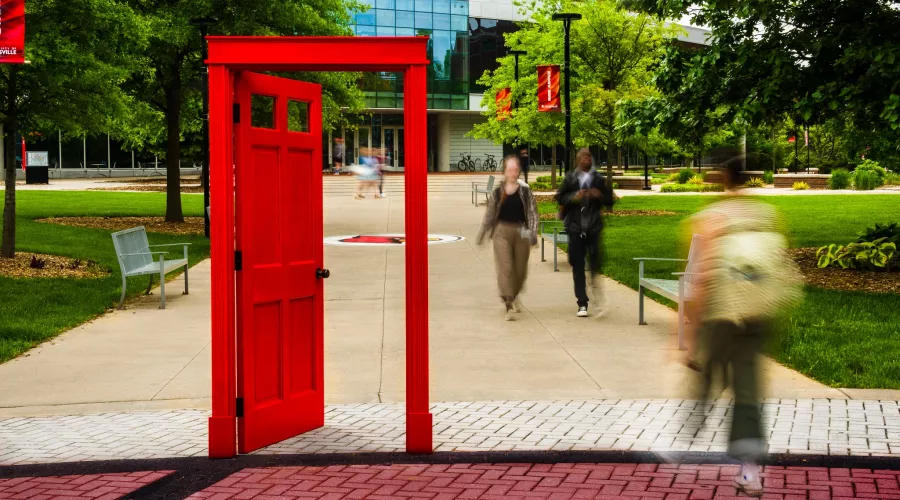Meeting students where they are
UofL is opening new doors in the classroom to give students a competitive boost in the workforce June 24, 2025
Photos by Tom Fougerousse.
cEntrepreneurship in the music industry. Hospitality management. Cybersecurity. Multicultural marketing. Human resources leadership.
These may all sound as related as apples and oranges, but each is just one area of study that collectively make up the cornucopia of specialized education programming overflowing at the University of Louisville.
Concerns about tuition costs, student debt and the return on investment of a college degree have many Americans questioning the value of a college education. However, colleges are not only providing students with aid to help make it accessible and affordable – like the Cardinal Commitment Grant which offers up to 100% of tuition coverage for eligible students – but they are also offering students countless opportunities to make their time spent earning a degree directly beneficial to their careers.
It is now more important than ever for schools to expand and grow curriculum that directly benefits students and fills the needs of the workforce and community. To evolve and help set students on a direct path to success, UofL is building unique minors, professional certificates and stackable certificates that meet students where they are, whether they’re first-time students aiming for a well-rounded college experience, alumni wishing to expand their education or professionals looking to gain an edge. These programs provide students with hard skills needed to be successful in their professions, valuable connections that can kickstart their careers and a competitive boost as they enter the workforce or advance in their careers.
Minor details, major opportunities
Many students often complement their primary area of study with a minor, a non-degree area of academic focus that provides a more well-rounded education.
As modern students take increasing ownership of their learning opportunities, some are even influencing departments to implement new minors to meet their specific goals through an interdisciplinary approach.
Some of these students, like Cishella Durling ’24, come from the liberal studies program in the College of Arts and Sciences (A&S), which offers an individualized major. Durling’s focus on disability studies in her individualized major and other students’ interest sparked the creation of disability resources as an official new minor through a collaboration between A&S and the College of Education and Human Development.
Andreas Elpidorou, director of the liberal studies program, works with students to create programs that fulfill their needs. He says that the disability resources minor is a combination of philosophy, sociology, education and interpretive studies, and teaches students ethical and advocacy skills with a practical and foundational approach. The minor can serve as a credential for students interested in social policy, social work, education and more.
“Students interested in becoming counselors or therapists, or working in disability rights advocacy, healthcare, special education … this will be a great starting point for them as they consider their career path,” Elpidorou said. “This minor is a way of augmenting students’ abilities, something that can give them a more nuanced understanding of disabilities and enhance their treatment of patients, students and people with disabilities.”
Junior Mallory Carr is studying early elementary education and was inspired to take the disability resources minor by a student with a disability in her summer daycare class. Carr hopes to be a first- or second-grade teacher after she graduates in 2026 and says the minor will make her job a bit easier as a teacher.
“I learned a lot from (my daycare student) and his family which made me want to learn more and be able to do more for him and others like him,” Carr said. “This minor is giving me the knowledge needed to help the students in my general education classroom so I can be more prepared to evaluate and refer students for special education testing. It is educating me more on the things that are going on in the minds of students on (Individualized Education Programs) and gives me the knowledge to help my students succeed and grow.”
Learning the hard skills needed to succeed in a career and gaining knowledge that students will use in their every day job makes these minors and certificates invaluable to students.
Elsewhere, at the College of Business, students interested in real estate development can build a better understanding of the field through the recently launched real estate minor. The minor is interdisciplinary, with ties to the J.B. Speed School of Engineering and Brandeis School of Law, and includes classes on real estate law, economics, finance, investments and development. Professor of real estate finance Patrick Nessenthaler says the program works with the Kentucky Real Estate Commission (KREC) and gives students opportunities to gain real-world experience through internship opportunities and mentorship connections with professionals in the field.
Joseph Woodruff ’24 majored in finance with a minor in real estate and now works as a development coordinator for LDG Development, developing affordable housing multifamily communities in North Carolina.
“I took the first class offered but was not planning on finishing the minor because I graduated too early to complete the full program,” Woodruff said. “After taking the first class … I was hooked and ended up staying an extra semester at UofL to take the entire real estate curriculum.”
UofL also partners with KREC to offer students two undergraduate classes within A&S that allow students to meet the Kentucky Real Estate License exam education requirement for sales associates when completed.
Certified for success
UofL’s commitment to boosting students’ skills and educational opportunities also extends beyond minors to professional certificates like the healthcare leadership and LGBTQ+ health studies certificates.
Anastasia Miller serves as the healthcare leadership certificate program director and said it was crafted to fill a void for adult students interested in working in any aspect of healthcare. Through the program, students learn modern, up-to-date curriculum on healthcare project management, human resources, finance, evaluation and more.
“Healthcare is not just a hospital, so we prepare students to succeed in a leadership role in any healthcare setting. Students get very applicable assignments, like what to do in case of a ransomware attack, which (is something that isn’t) always updated in normal academia,” Miller said. “It’s not just discussion boards – this is mixed with a real-world setting.”
Miller said the flexibility of being an online student is invaluable to the success of adult students who may be balancing things like full-time work, raising children or other commitments. “Our program has mostly working adults,” she said,” so it’s really better for them if they need to take their time and navigate life’s changes.”
UofL also offers stackable online certificates that allow students to acquire specialized knowledge in a specific field or discipline. These customized certificates allow students to build their expertise gradually, rather than pursuing a traditional linear degree pathway as each certificate can be earned as a standalone credential and/or as a step toward a future degree. The flexibility of stackable certificates offers students a continuous learning mindset that gives professionals the ability to adapt and keep up with industry changes.
Setting Cardinals apart
The real-world knowledge and opportunities these unique minors and certificates offer empower students to advance in their careers – on their own terms.
“The financial modeling taught in the real estate minor was incredibly beneficial to me in my work,” Woodruff said. “Understanding the underwriting in commercial real estate is not only important, but essential to making educated decisions. The financial modeling taught in this program gave me a head start, and an understanding better than some of my colleagues with many years in the business.”
Learning the hard skills needed to succeed in a career and gaining knowledge that students will use in their every day job makes these minors and certificates invaluable to students.
Carr said this direct knowledge made the decision to minor in disability resources an easy one.
“No other minor offered me things that I would be able to use every day in my career,” she said.
Marie Miller is earning her certificate in healthcare leadership through UofL online programs and works in clinical implementation at Humana. She said the real-world application of the program is vital to her work.
“I'm living it daily,” she said, “and can speak to the fact that it supports the type of leadership needed in the environment I work in every day.”
These programs are not only providing students with the hard skills needed for a particular field. Woodruff said they also give students the soft skills and connections needed to succeed and advance.
“An important lesson I learned from the real estate minor was that real estate is a business of relationships and knowing yourself,” he said. “Being mathematically capable can only get you so far, and relationships are where deals are made – and jobs are found.”
Woodruff credits Nessenthaler and the real estate minor curriculum for getting him where he is today in his career.
“I only knew about LDG Development through an introduction facilitated by (Nessenthaler). I think the work done to ensure the real estate minor is not limited to the classroom but includes discussion and support from real estate companies throughout Louisville is a characteristic that sets the program apart,” Woodruff said. “The real estate minor provided me the opportunity for multiple job interviews and one-on-one discussions with real estate professionals that I otherwise would not have been exposed to.”
Marie Miller echoes Woodruff in recognizing the value of these programs and meeting students evolving needs.
“The classes in this certificate help me navigate situations in my current role, and it also opened the door for my most recent promotion,” she said, “effectively giving me more opportunities now and (allowing) me to be considered for more advanced roles in the future.”
These minors and certificates are not only giving students a holistic, well-rounded education, they are also helping them prepare for and excel in their careers, no matter their discipline. As these programs and more continue to grow, UofL remains dedicated to filling the needs of its students and communities to help build a better world here and beyond.
“We want students to stay in Louisville, but also make an impact beyond our community and state, globally,” Nessenthaler said. “We’re very excited about that.”
Explore more stories from the spring/summer 2025 issue of UofL Magazine
Caitlin Brooks is a communications and marketing coordinator in the Office of Communications and Marketing. Brooks joined OCM after earning her Bachelor of Science and Master of Art degrees in Communication from UofL. Brooks previously worked as a graduate assistant and public speaking instructor at UofL and is an avid Broadway and Disney fan.
UofL Magazine is the university's premier magazine for alumni and friends. To submit story ideas, provide feedback or contact the editor, please email editor@louisville.edu.
Related News




